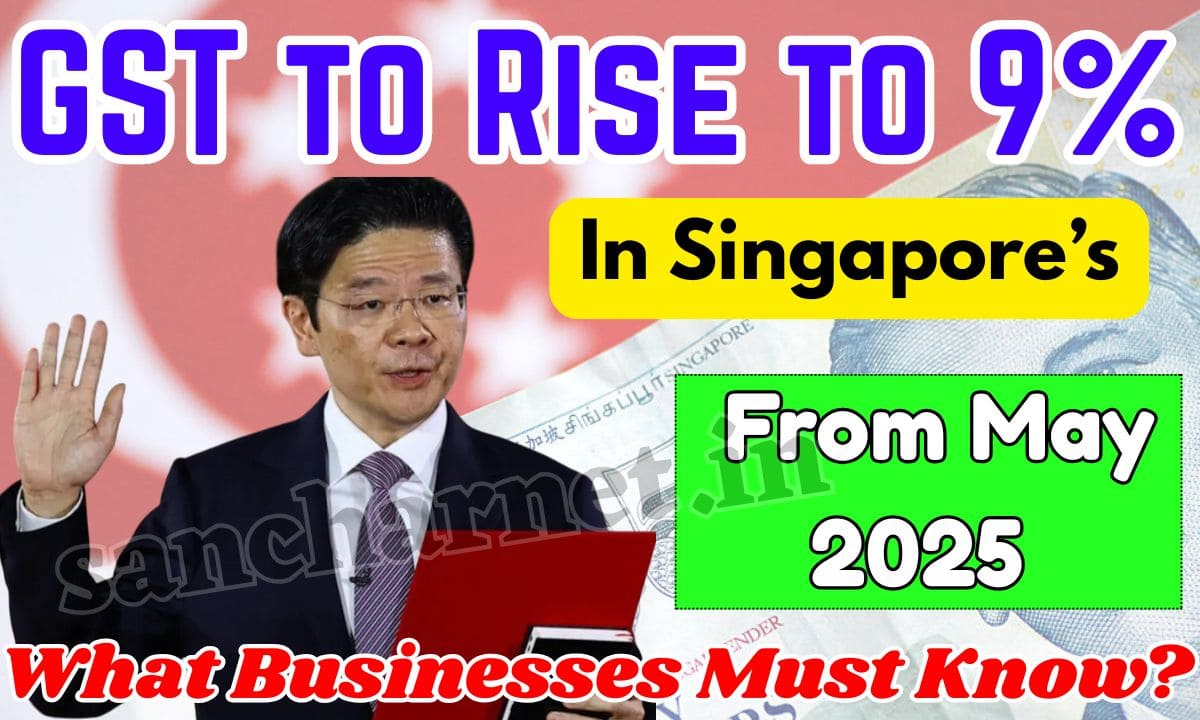Singapore’s GST to Rise to 9% from May 2025: Starting May 1, 2025, the Goods and Services Tax (GST) in Singapore will officially increase from 8% to 9%. Companies operating in the country must start preparing now to avoid compliance issues and operational disruptions. This change follows a previous increase from 7% to 8% in 2023 and is part of a broader long-term fiscal plan announced during Singapore’s 2022 Budget.
It’s a value-added tax applied to most goods and services, including imports. The new rate will impact pricing, invoicing, and overall business operations. Businesses that fail to adjust in time risk facing penalties and administrative challenges.
Important GST Dates and Details
To ensure a smooth transition, businesses must be familiar with the updated Goods and Services Tax timelines. Here’s a quick overview :-
| Item | Details |
| Regulatory Authority | Inland Revenue Authority of Singapore (IRAS) |
| Current Goods and Services Tax Rate | 8% (since May 1, 2023) |
| New Goods and Services Tax Rate | 9% |
| Effective Date | May 1, 2025 |
| Scope | All taxable goods, services, and imported products |
CRA $2790 Benefit to Seniors – Mark this date on your calendar!
Pension Back Payments Up to £12000 Only Those Women Will Receive: Are You Eligible?
Starting from May 1, 2025, any goods delivered or services provided must include the 9% GST rate, even if the invoice was issued earlier. Businesses are required to reflect the updated rate in their GST returns or risk penalties for non-compliance.
Why Singapore Is Raising Goods and Services Tax?
The decision to raise Goods and Services Tax was outlined in the 2022 Budget Statement, aimed at ensuring long-term fiscal sustainability amid rising national expenditures.
Key reasons for the increase include
Rising Healthcare Expenses: An aging population is driving higher healthcare spending.
- Infrastructure Expansion: Significant investments in public transport, housing, and urban development projects continue.
- Strengthening Social Programs: More funding is needed for education, security, and senior care programs.
- The GST adjustment ensures the government can meet growing demands without increasing debt burdens for future generations.
How Businesses Should Prepare for the 9% GST?
Companies registered under the Goods and Services Tax regime must start preparing well in advance to ensure seamless operations post-transition. Here are crucial steps to take :-
- Update Pricing
All displayed prices, whether in stores, online platforms, or marketing materials, must be adjusted to reflect the new 9% Goods and Services Tax by May 1, 2025. - Revise POS Systems
Ensure that all point-of-sale (POS) systems are reconfigured to calculate and charge the correct Goods and Services Tax rate. - Amend Online Listings and Price Tags
Businesses selling online must update their product listings, websites, and published price sheets to incorporate the revised tax rate. - Train Staff
Frontline employees, particularly those handling sales and invoicing, must be trained to apply the correct Goods and Services Tax rates during the transition period. - Review Contracts
Examine all ongoing contracts and agreements to determine whether Goods and Services Tax clauses require updates. Make necessary adjustments to reflect the new rate. - Upgrade Accounting and ERP Systems
Make sure that accounting software, invoicing platforms, and ERP systems are updated to comply with the new Goods and Services Tax rate. - Seek Professional Advice
Consult a tax advisor or Goods and Services Tax specialist to evaluate your company’s readiness and to ensure full compliance with IRAS guidelines.
Common Transition Scenarios
Understanding how the new GST rate applies in various scenarios is critical. Here’s what businesses need to know:
- Goods or services delivered before May 1, 2025: 8% GST applies, even if the invoice is issued later.
- Goods or services delivered on or after May 1, 2025: 9% GST must be charged, regardless of when the invoice was issued.
- Partial Payments: It should be applied based on the date of delivery, not the payment date.
- Properly managing these cases will prevent potential tax reporting errors and penalties.
Conclusion :-
With the GST increase to 9% just around the corner, Singapore businesses must act swiftly to adapt their operations. From revising pricing systems and updating contracts to training employees and ensuring software compliance, early preparation is crucial.
CRA $2600 Direct Deposit in May 2025: Payment Dates, Eligibility, and How to Claim
Early Social Security Payment for 2025 – Everything You Need to Know
By staying informed about the Inland Revenue Authority of Singapore (IRAS) guidelines and seeking professional advice when needed, businesses can transition smoothly and continue operating without disruption. Proactive measures today will prevent costly mistakes in 2025.
FAQ’s on Singapore’s GST Increase in 2025
What will the GST rate be starting May 2025?
The GST rate will rise to 9% beginning May 1, 2025.
Why is Singapore increasing the GST?
The GST hike supports national needs such as healthcare, infrastructure improvements, and enhanced social services.
What happens if I don’t update my systems by May 1, 2025?
Businesses that fail to update their systems could face billing errors, tax misreporting, and possible penalties for non-compliance.
Will all goods and services be affected?
Yes, most goods, services, and imported products currently subject to GST will be impacted by the rate change.
Do I need to update the invoices?
Yes, all your invoices for supplies made on or after May 1, 2025, must reflect the 9% GST rate.
Will consumers feel the impact of the GST hike?
Yes, the tax increase will likely result in higher prices for consumers as businesses pass on the additional costs.
Should businesses update existing contracts?
It is advisable to review all ongoing contracts and include clauses that allow adjustments for tax changes.
What are transitional rules?
Transitional rules guide businesses on how to correctly apply GST rates for transactions spanning before and after the effective date.
Who administers GST in Singapore?
The Inland Revenue Authority of Singapore (IRAS) oversees the GST regime and ensures business compliance.
Is there help available for SMEs?
Yes, SMEs can seek assistance from IRAS and engage tax professionals to navigate the GST change smoothly.







